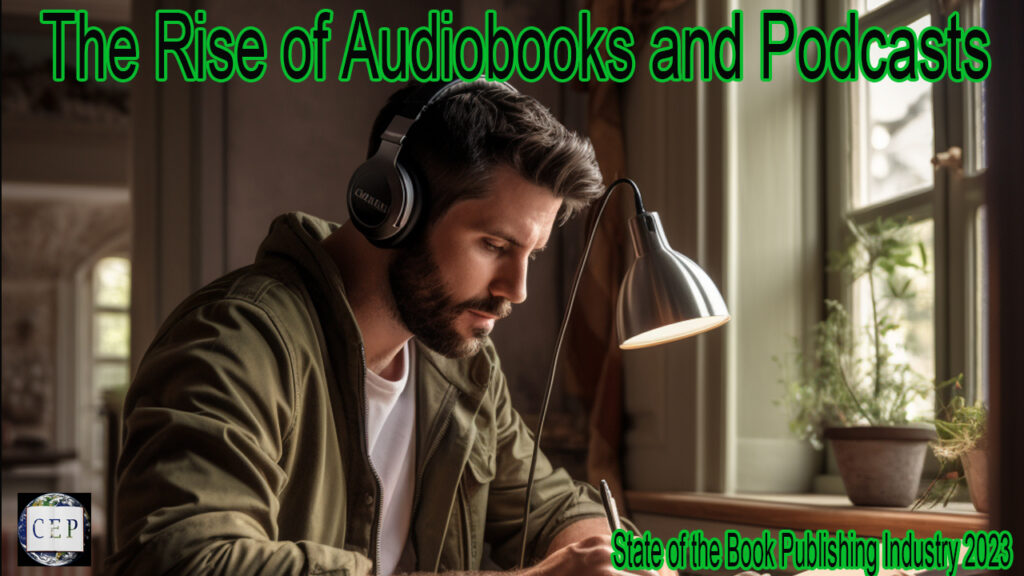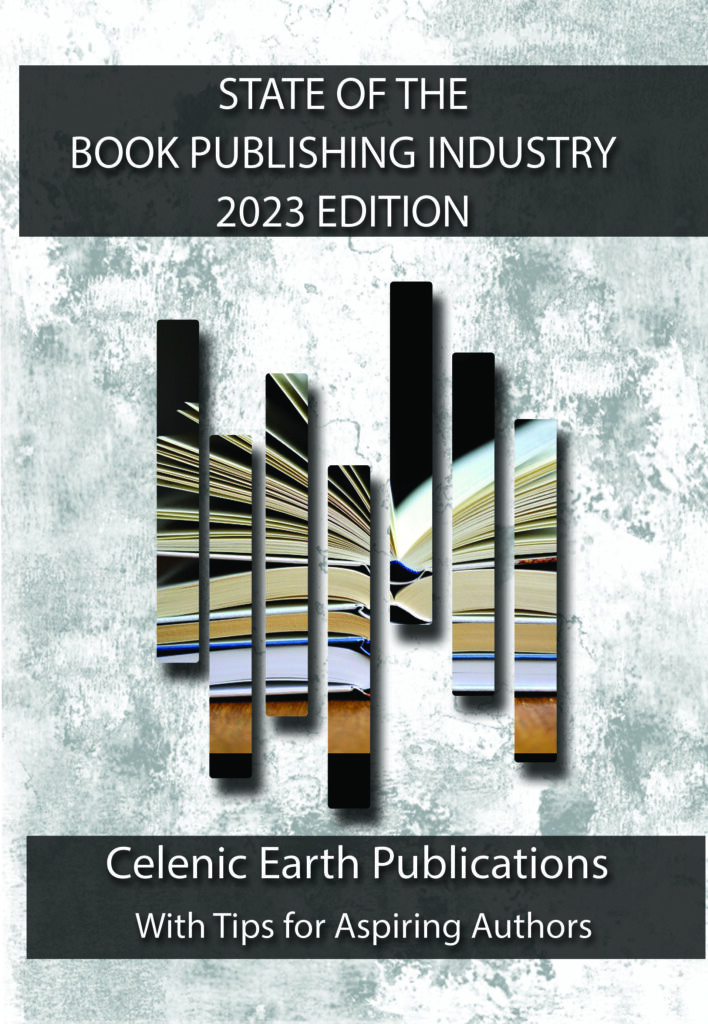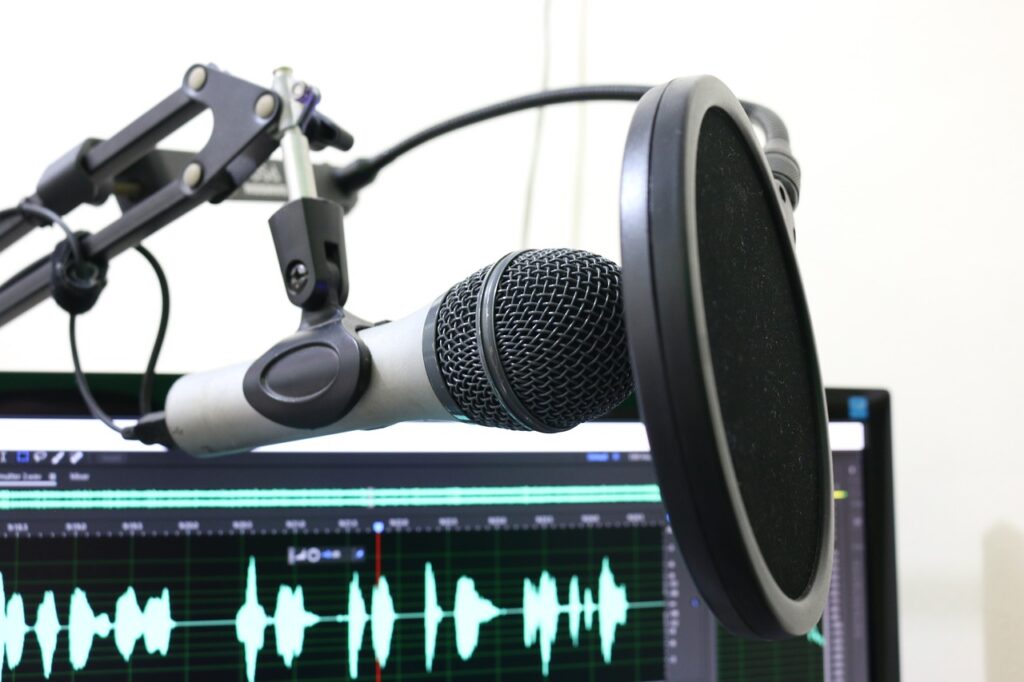
In the ever-evolving landscape of the publishing industry, one phenomenon stands out as a shining beacon of transformation: the extraordinary rise of audiobooks. With the advent of digital media and the changing habits of readers and listeners, audiobooks have grown to become a powerful force in the world of storytelling. This article is part of our series closely linked to “State of the Book Publishing Industry 2023,” where we delve into the latest trends and innovations shaping the world of books.
Audiobooks have become synonymous with convenience and accessibility, offering readers the freedom to consume their favourite literature while multitasking, whether they’re commuting, working out, or simply enjoying a leisurely walk. As we explore the impact and relevance of audiobooks in this series, we uncover an exciting transformation within the publishing industry, one that cannot be ignored.
So, why the focus on audiobooks? The answer is simple: they represent a pivotal evolution within the industry. As technology advances and consumer preferences shift, audiobooks have emerged as a driving force behind the way stories are delivered, offering not only auditory pleasure but also an enhanced reading experience.
Join us on this journey as we analyze the growth of audiobooks, discuss their appeal, and compare them to the ever-popular podcast-style storytelling. As we examine the audiobook revolution, we aim to provide authors and publishers with valuable insights and strategies for success in this changing landscape.
Let’s embark on an exploration of the fascinating world of audiobooks and podcast-style storytelling, all while recognizing their pivotal role in the ongoing evolution of the publishing industry.

The Growth of Audiobooks
Audiobooks, once considered a niche market, have transformed into a major player in the publishing industry, captivating readers and listeners worldwide. You can see how the selection of Amazon audiobooks has grown. This section explores the remarkable ascent of audiobooks and their undeniable influence on the way we consume literature.
A. The Audiobook Explosion
The growth of audiobooks has been nothing short of explosive. According to the Audio Publishers Association, audiobook sales have been experiencing double-digit growth in recent years, with 2022 seeing a significant surge in popularity. This is not a passing trend; it’s a seismic shift in how we experience literature.
B. Factors Contributing to Popularity
Several factors contribute to the surging popularity of audiobooks:
Convenience: Audiobooks offer the convenience of enjoying a book without having to set aside dedicated reading time. People can listen while commuting, doing household chores, or during their daily exercise routines.
Multitasking: In today’s fast-paced world, multitasking is a way of life. Audiobooks provide a perfect solution for those who want to make the most of their time.
Improved Narration: High-quality narrators and voice actors bring stories to life. The art of audiobook narration has reached new heights, enhancing the overall listening experience.
C. Successful Audiobooks
Many authors and publishers have witnessed the remarkable success of audiobooks. Works of fiction, non-fiction, and even academic literature have been successfully adapted into audiobook formats. Notable examples include:
- “Becoming” by Michelle Obama: The former First Lady’s memoir was not only a bestseller in print but also a massive hit in audiobook format, narrated by Michelle Obama herself.
- “Where the Crawdads Sing” by Delia Owens: This bestselling novel has captivated readers and listeners alike, with the audiobook gaining widespread acclaim for its narration.
- Educational Audiobooks: Even educational content is finding a home in audiobooks, making learning more accessible and engaging for students of all ages.
The growth of audiobooks extends far beyond entertainment. It represents a dynamic shift in how we engage with literature and ideas. Authors and publishers who embrace this evolution open doors to new audiences and opportunities, ensuring their work resonates with a diverse and ever-evolving readership.

The Appeal of Podcast-Style Storytelling
Podcasts have become an integral part of the modern media landscape, offering a unique storytelling experience that has captured the hearts and ears of audiences worldwide. In this section, we’ll delve into what makes podcast-style storytelling so appealing and how it’s transforming the way we consume narratives.
A. The Essence of Podcast-Style Storytelling
Podcast-style storytelling, often synonymous with serialized narratives or audio dramas, provides a distinct form of engagement for listeners. Unlike traditional audiobooks, podcast-style storytelling thrives on episodic content and often features immersive soundscapes, voice acting, and intricate plots.
B. Trends in Podcast Creation and Consumption
The world of podcasts is evolving rapidly, with a plethora of genres and formats to explore. Key trends in podcast creation and consumption include:
Diverse Genres: Podcasts cover an extensive range of genres, from true crime and science fiction to history and self-help. This diversity ensures there’s something for everyone.
Serialized Narratives: Serialized storytelling, where stories unfold across multiple episodes, has gained immense popularity. This format keeps audiences eagerly awaiting each new installment.
Interactive Content: Some podcasts encourage listener engagement, inviting them to participate in solving mysteries or making decisions that affect the storyline.
C. Benefits of Podcast-Style Storytelling
What makes podcast-style storytelling so appealing to authors, creators, and audiences? Several factors contribute to its allure:
- Accessibility: Podcasts are easily accessible through various platforms and apps, making it simple for listeners to discover and enjoy content.
- Immersive Experience: High-quality sound design and voice acting create immersive experiences, enhancing the emotional connection between the audience and the narrative.
- Community Building: Podcasts often foster dedicated communities of listeners who engage in discussions, fan theories, and even live events related to their favourite shows.
- Creativity Unleashed: Podcast-style storytelling allows creators to experiment with diverse formats and engage in unconventional storytelling techniques.
- Exploration of Niche Topics: Podcasts cater to niche interests and often explore subjects that might not receive as much attention in traditional media.
The appeal of podcast-style storytelling lies in its ability to captivate and entertain, offering a unique audio experience that transcends the boundaries of traditional literature. In the next section, we’ll compare audiobooks and podcast-style storytelling, highlighting the strengths and opportunities of each format.

Audiobooks vs. Podcasts: A Comparison
As the worlds of audiobooks and podcast-style storytelling continue to expand, it’s important to understand the distinctions between these two audio formats. This section provides a comparative analysis, highlighting the unique features, audiences, and advantages of each format.
A. Key Differences Between Audiobooks and Podcasts
| Key Element | AudioBooks | Podcasts |
| Narrative Structure | Typically present a single, cohesive narrative, mirroring traditional books. | Often feature episodic content with separate storylines, cliffhangers, and diverse formats. |
| Consumption Experience | Intended for uninterrupted listening, often in one sitting. | Designed for shorter, episodic listening, suitable for commutes or breaks. |
| Audience Engagement | Primarily attract readers who prefer continuous, immersive narratives. | Appeal to those seeking a variety of content, including non-fiction, true crime, and serialized dramas |
| Target Audience | Ideal for readers who appreciate the traditional book experience but prefer auditory storytelling.Attract those who want to enjoy literature while multitasking or when reading isn’t feasible. | Appeal to a broader audience, including listeners looking for entertainment, education, and niche interests. Attract younger demographics and individuals seeking diverse content options. |
B. Advantages and Disadvantages of Each Format
Audiobooks:
Advantages:
- Provide a seamless reading experience for those accustomed to printed or digital books.
- Offer high-quality narration and in-depth character exploration.
- Ideal for novels, non-fiction, and academic content.
Disadvantages:
- May not suit those who prefer shorter, episodic content.
- Typically requires longer listening sessions.
Podcasts:
Advantages:
- Offer a wide array of content, catering to diverse interests.
- Encourage listener engagement and discussion within dedicated communities.
- Ideal for serialized storytelling and experimental formats.
Disadvantages:
- Some podcasts may lack the polished production quality found in audiobooks.
- May have shorter episodes that require regular follow-ups.
In the dynamic world of audio content, the choice between audiobooks and podcasts ultimately depends on individual preferences, content goals, and the intended audience. Authors and publishers should carefully consider which format best aligns with their objectives.

Tips for Authors and Publishers
As the demand for audiobooks and podcast-style storytelling continues to surge, authors and publishers can harness the power of these formats to reach a wider audience. This section provides practical tips for those looking to adapt and optimize their content for both audiobooks and podcasts.
A. Audiobooks:
- Select the Right Narrator: The narrator plays a crucial role in audiobook success. Choose a professional narrator whose voice complements the tone and content of the book.
- Maintain Clarity: Ensure that the narration is clear and well-paced, making it easy for listeners to follow the story.
- Optimize for Audio: Keep in mind that not all content is suitable for audio. Consider whether your book’s visuals or complex formatting can be adapted effectively.
- Leverage Sound Effects: In some cases, the addition of sound effects and background music can enhance the listening experience, creating a more immersive environment.
- Market Aggressively: Promote your audiobook across platforms and reach out to audiobook communities to build a dedicated listener base.
B. Podcasts:
- Plan Your Content: Before starting a podcast, carefully plan your content, including episode structure, topics, and overall direction.
- Invest in Equipment: Quality audio is essential. Invest in good microphones, audio editing software, and soundproofing to ensure a professional sound.
- Release Consistently: Establish a regular release schedule to keep your audience engaged. Consistency builds trust and keeps listeners coming back.
- Engage with Your Audience: Encourage listener engagement through social media, feedback, and Q&A sessions. Building a community around your podcast can boost its popularity.
- Collaborate: Consider collaborating with other podcasters or authors to cross-promote your work and reach new audiences.
C. Real-Life Examples
Several authors and publishers have successfully ventured into the world of audiobooks and podcasts:
- Neil Gaiman: The acclaimed author has narrated many of his audiobooks, creating a strong connection with his audience.
- Serial Podcast: This groundbreaking podcast reinvigorated interest in true crime narratives and launched a new era of serialized storytelling.
- “Welcome to Night Vale”: A podcast-style audio drama that became a cult hit, demonstrating the potential for original and unique podcast content.
- Educational Podcasts: Many educational publishers now offer podcasts that supplement their textbooks and provide additional learning resources.
By following these tips and drawing inspiration from successful examples, authors and publishers can make a meaningful impact in the audiobook and podcast formats. These mediums provide new opportunities to connect with audiences, experiment with storytelling, and expand the reach of literary works.

The Future of Audio Content
The world of audio content is dynamic and ever-evolving, with exciting prospects and innovations on the horizon. As authors, publishers, and content creators adapt to the changing landscape, it’s essential to anticipate and prepare for the future of audio content.
A. Emerging Technologies and Trends
- Enhanced Interactivity: The future of audio content may include increased interactivity. Listeners could participate in choose-your-own-adventure-style stories or influence the direction of narratives through their choices.
- Immersive Audio: Advancements in audio technology, such as 3D audio and spatial sound, will create more immersive listening experiences, making it feel as though the story is unfolding all around the listener.
- AI-Generated Narration: Artificial intelligence (AI) is being used to generate narration that mimics human voices. This technology may become more refined and accessible for audiobook production.
- Personalization: Audio platforms may offer tailored content recommendations and personalized storytelling experiences based on user preferences and behaviours.
- Accessible Publishing: The industry will likely continue to focus on making audio content more accessible to individuals with disabilities, ensuring inclusivity.
B. Speculations on the Evolution
As audio content evolves, we can anticipate:
- Expanding Genres: New genres and sub-genres of audio content will emerge, catering to diverse interests and niche audiences.
- Global Reach: Audio content will continue to transcend language and geographical barriers, connecting creators and listeners worldwide.
- Hybrid Formats: We may see hybrid formats that combine the best of audiobooks, podcasts, and interactive storytelling.
- Education and Learning: Educational institutions and publishers will integrate audio content into the learning experience, offering new opportunities for students.
C. Opportunities and Challenges
Authors and publishers will need to embrace opportunities while addressing challenges in this evolving landscape:
Opportunities:
- Broader Audience Reach: Audio formats provide a unique opportunity to reach wider and more diverse audiences.
- Creative Experimentation: Authors and publishers can experiment with innovative storytelling techniques and formats.
- Brand Building: Successful audio content can strengthen an author or publisher’s brand and fan base.
Challenges:
- Production Costs: High-quality audio production can be costly and time-consuming.
- Market Saturation: With the proliferation of audio content, standing out from the competition becomes increasingly challenging.
- Technological Barriers: Staying updated with evolving audio technologies can be a hurdle for creators.
The future of audio content is filled with exciting possibilities, but it also demands adaptability and an understanding of the ever-changing preferences and expectations of audiences. As we move forward, it’s vital for authors, publishers, and content creators to stay attuned to emerging trends and harness the full potential of audio content in the publishing industry.

Shaping the Sonic Future of Storytelling and Publishing
In a world where technology and innovation continue to redefine the way we interact with literature, audio content stands at the forefront of a sonic revolution. The audiobook and podcast-style storytelling have not only broadened the horizons of storytelling but have also redefined how authors and publishers engage with their readers. As our article closely linked to “State of the Book Publishing Industry 2023” concludes, it is clear that the rise of audiobooks and podcast-style storytelling has ushered in a new era of literature, one characterized by accessibility, immersion, and the power of the spoken word.
With the growth of audiobooks and podcasts, we’ve witnessed literature breaking free from the confines of printed pages, offering listeners the opportunity to explore stories in the midst of their daily lives. The audiobook industry continues to thrive, boasting impressive sales figures and a growing legion of dedicated fans. Podcast-style storytelling has captivated audiences with its diverse array of content, from true crime mysteries to immersive audio dramas.
The future of audio content holds the promise of even greater interactivity, more immersive experiences, and the seamless integration of new technologies, ensuring that audio remains an essential and vibrant medium for literature. Authors and publishers now have a broader canvas on which to paint their stories, with innovative formats and diverse content that resonate with a global audience.
As we conclude our exploration of audio content’s significance and the impact it has on the publishing industry, it is evident that the power of the human voice and the spoken narrative will continue to shape the way we experience literature. Embracing the potential of audiobooks and podcasts means embracing the future of storytelling and the boundless possibilities it brings.
In this journey through the world of audio content, we invite authors, publishers, and readers to recognize that in the midst of a shifting landscape, one constant remains: the enduring enchantment of a well-told tale, now available in ever more accessible and immersive forms.


